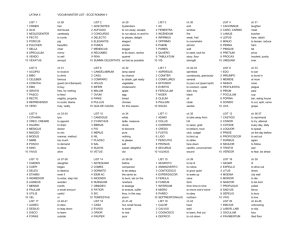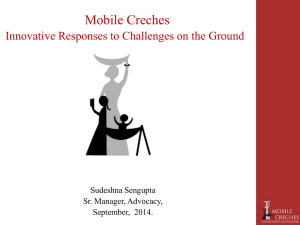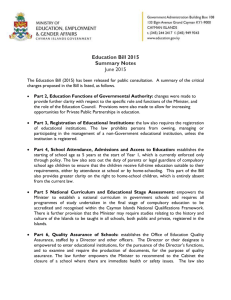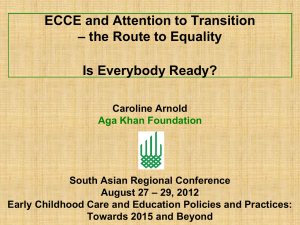Opening Statement by Ms. Evelyn Reilly
advertisement
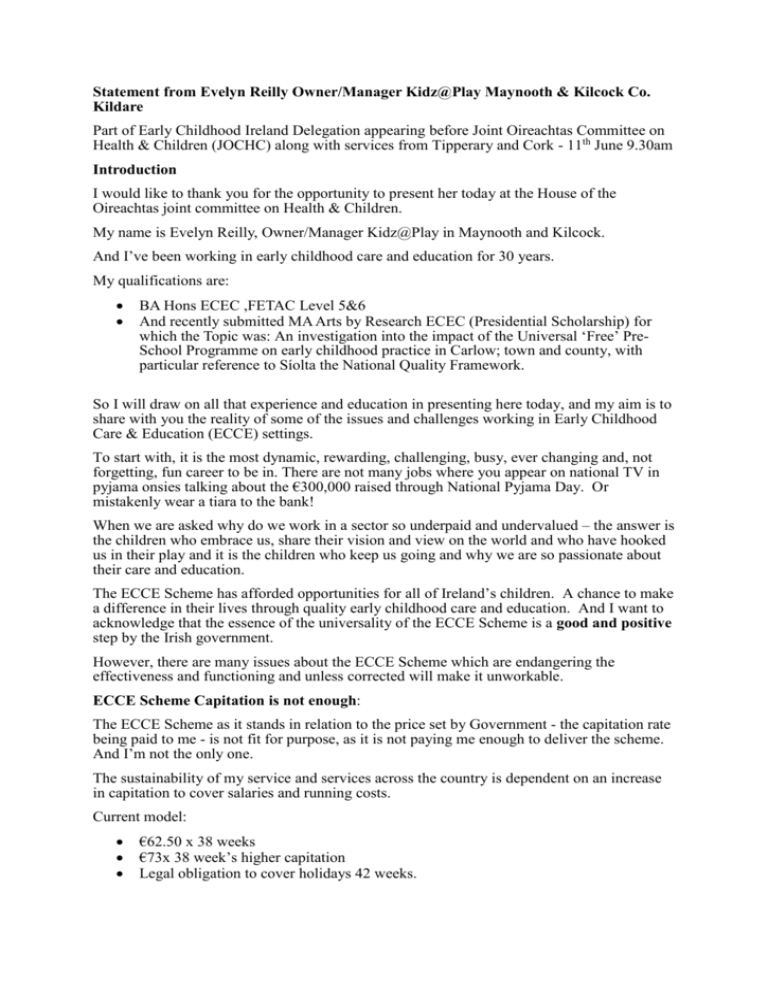
Statement from Evelyn Reilly Owner/Manager Kidz@Play Maynooth & Kilcock Co. Kildare Part of Early Childhood Ireland Delegation appearing before Joint Oireachtas Committee on Health & Children (JOCHC) along with services from Tipperary and Cork - 11th June 9.30am Introduction I would like to thank you for the opportunity to present her today at the House of the Oireachtas joint committee on Health & Children. My name is Evelyn Reilly, Owner/Manager Kidz@Play in Maynooth and Kilcock. And I’ve been working in early childhood care and education for 30 years. My qualifications are: BA Hons ECEC ,FETAC Level 5&6 And recently submitted MA Arts by Research ECEC (Presidential Scholarship) for which the Topic was: An investigation into the impact of the Universal ‘Free’ PreSchool Programme on early childhood practice in Carlow; town and county, with particular reference to Síolta the National Quality Framework. So I will draw on all that experience and education in presenting here today, and my aim is to share with you the reality of some of the issues and challenges working in Early Childhood Care & Education (ECCE) settings. To start with, it is the most dynamic, rewarding, challenging, busy, ever changing and, not forgetting, fun career to be in. There are not many jobs where you appear on national TV in pyjama onsies talking about the €300,000 raised through National Pyjama Day. Or mistakenly wear a tiara to the bank! When we are asked why do we work in a sector so underpaid and undervalued – the answer is the children who embrace us, share their vision and view on the world and who have hooked us in their play and it is the children who keep us going and why we are so passionate about their care and education. The ECCE Scheme has afforded opportunities for all of Ireland’s children. A chance to make a difference in their lives through quality early childhood care and education. And I want to acknowledge that the essence of the universality of the ECCE Scheme is a good and positive step by the Irish government. However, there are many issues about the ECCE Scheme which are endangering the effectiveness and functioning and unless corrected will make it unworkable. ECCE Scheme Capitation is not enough: The ECCE Scheme as it stands in relation to the price set by Government - the capitation rate being paid to me - is not fit for purpose, as it is not paying me enough to deliver the scheme. And I’m not the only one. The sustainability of my service and services across the country is dependent on an increase in capitation to cover salaries and running costs. Current model: €62.50 x 38 weeks €73x 38 week’s higher capitation Legal obligation to cover holidays 42 weeks. The current model covers 15 hours contact time with children. While Non- Contact time (that means time to plan, document, evaluate, reflect, meet parents, team meetings, all essential and all part of quality ECCE) gets no extra funding – not a cent. And yet this is critical work in delivering the scheme. Current capitation has to be stretched to cover non - contact time and holidays. That is an absolute must and we are depending on this Committee to get that message across loud and clear. Other issues I have in relation to the ECCE contract: Returning capitation if child is absent for over 20 days. This element of the scheme is unworkable and not fair, putting services like mine in the position of ‘policing’ families who take holidays, visit families abroad or children in hospital/medical conditions. And me taking on this policing role, while the ECCE Scheme is not compulsory to attend? This doesn’t make sense. Anomaly: National Schools do not have to return capitation. And National Schools are given time for planning and meetings and holidays. The ECCE Scheme lets children with additional needs down: We’ve seen an increase in children attending with many additional needs, some diagnosed, some undiagnosed. The lack of support for these children is so unfair, with a delay in assessment of needs and consultants. No availability of SNA for ECCE services. These children are entitled to their ECCE place but not supported in taking it up and it is in breach of children’s rights. We all know that Early Intervention is key but, as much as we’d like to say Yes to every child, services like mine supporting children with additional needs with additional staff is not always viable. I have plenty of examples to share with you on this, without breaching confidentiality. I have one little girl with autism who has been told that she won’t be supported by the HSE for another year with us, but they’ll find the budget to taxi her to an autism unit which will cost more money, and will set this child back socially and her mother is in bits. Autism units work for some children but it’s not what this family want for their child, and they should be supported and given the choice to stay with me. Anomaly: National Schools access to SNA and extra Capitation to support these children. ECCE Scheme should support Disadvantaged children, not just Disadvantaged areas: The original promise of the ECCE scheme was that it would impact positively for children from disadvantaged circumstances. And services like mine can see this positively with an increase in disadvantaged children attending since the scheme was introduced. However, there are real issues around the support required for these families and our staff work with the family’s key worker and this has a time impact, and it’s all necessary and positive, because the families need that extra support. But it’s not funded, putting our service at a financial disadvantage and that’s not sustainable and it’s not fair. Anomaly: Early start programme recognise these children require extra support and their funding is almost double at €4474, €2774 higher capitation. National schools given extra financial and resource support. ECCE Scheme nothing extra, no extra access to support. I suggest it is Children, not areas disadvantaged and all disadvantaged children in ECCE settings should be afforded equal support. I would remind all that these children’s rights to participation under the UNCRC (1989) to which Ireland ratified in full are not being met due to unequal and limited supports. So what are you going to do about that, as the Joint Oireachtas Committee representing health and children? Recognising and Rewarding ECCE Professionals: Let me tell you about Emma and Sarah (permission given to share their stories) Emma came to my playschool in Transition Year. She completed FETAC Level 5, doing work experience in my playschool. She successfully achieved a Hons degree ECEC and now works for me and leads curriculum planning. However, Emma has to supplement her income by working in local pub and signing on in summertime, if she can’t get part-time work. Sarah is my Supervisor and another star professional that has worked in my service for over 10 years. She has a FETAC Level 6 and hopes to follow this with a degree. Sarah got married last year and recently was deemed not suitable for a mortgage due to the seasonal nature of her job and had difficulty obtaining a car loan. These are real examples of how the ECCE Scheme capitation is not sufficient. I pay them as much as I can, but it’s not enough. The Government can’t set the price for the ECCE scheme and simply say it doesn’t get involved in pay and conditions. The ECCE scheme payment dictates pay and conditions. While we will see an increase in the number of qualified people working in ECCE services, helped by the 2015 September mandatory qualification; and we now have a Learner fund to support professional development, people have got to see an increase in pay linked with increasing qualification. But this is Not viable under current capitation. The result across the country? We see ECCE Degree graduates leaving the sector or just not contemplating this as a career, due to seasonal contracts and the need to get other part-time jobs to subsidise wages, to sign on in the summer months and they are refused car loans, never mind a mortgage. Salary comparisons: ECEC Degree Hons: €15,561 seasonal: Source ECI Salary survey 2014 Primary Teaching Degree: €27.814. BA Ed. Fulltime starting salary scale. Source DES.2015 Difference in €12,000 per annum. Call to Action I am calling for a national evaluation of the ECCE Scheme with review of conditions and capitation, support for disadvantage and additional needs children a priority. And I hope that this Committee will echo my call to action. I would like to finish with a quote from an American activist for the rights of children Marian Wright Edelman and thank you for this opportunity. ‘The question is not whether we can afford to invest in every child; it is whether we can afford not to.’ -Marian Wright Edelman: American activist for the rights of children

